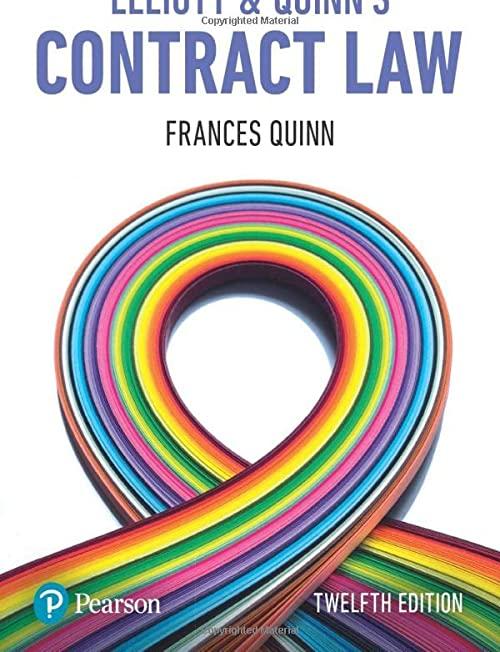Question
Question - The following questions are to be answered on the basis that the Statute has not been enacted in Australia: Without the Statute, from
Question - The following questions are to be answered on the basis that the Statute has not been enacted in Australia:
Without the Statute, from a conflict of laws perspective, if an Australian commences a lawsuit in an Australian Court against a cruise ship operator (domestic or foreign) where the terms of carriage include a choice of forum/choice of law pointing to a Convention country, such as Italy, what are thelikely conflict of laws procedures that may be called into play by the parties? [Just list]
My answer:
Without the statute, from a conflict of laws perspective, if an Australian commences a lawsuit in an Australian Court against the cruise ship operator (domestic or foreign) where the terms of carriage include a choice of form/choice of law to a Convention country, such as Italy, there are a few likely conflicts of laws procedures that may be called into play by the parties.
A conflict of laws arises when an issue in a legal dispute has a significant connection to more than one country. In such a situation, the legal principles of each country may be applied to the dispute. The conflict of laws rules that may be called into play by the parties, in this case, are 1) the lex loci delicti rule, which provides that the law of the place where the tort was committed will be applied; 2) the rule of lex fori, which provides that the law of the forum will be applied; and 3) the rule of lex contractus, which provides that the law governing the contract will be applied.
The likely conflict of laws procedures that may be called into play by the parties are:
- Whether the court has jurisdiction over the matter. If the court does not have jurisdiction, the matter will be dismissed.
- If the court does have jurisdiction, it will then consider whether the choice of forum/choice of law clause is valid and enforceable.
- If the clause is found to be valid and enforceable, the court will apply the law specified in the clause.
- If the clause is found to be invalid or unenforceable, the court will apply the law of the country in which the injury occurred.
- The court will consider a number of factors when determining whether it has jurisdiction, including:
- The plaintiff's domicile: If the plaintiff is domiciled in Australia, the court will likely have jurisdiction.
- The defendant's domicile: If the defendant is domiciled in Australia, the court will likely have jurisdiction.
- The place of the injury: If the injury occurred in Australia, the court will likely have jurisdiction.
- The court will also consider the nature of the claim and the law that would apply if the clause is not enforced. If the claim is based on negligence and the law of the country in which the injury occurred would provide more protection to the plaintiff than the law specified in the clause, the court may find that the clause is invalid or unenforceable.
I need help with finding the legislation and relevant case law to support my answer.
Step by Step Solution
There are 3 Steps involved in it
Step: 1

Get Instant Access to Expert-Tailored Solutions
See step-by-step solutions with expert insights and AI powered tools for academic success
Step: 2

Step: 3

Ace Your Homework with AI
Get the answers you need in no time with our AI-driven, step-by-step assistance
Get Started


